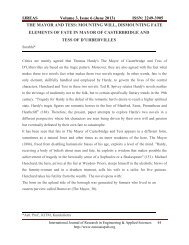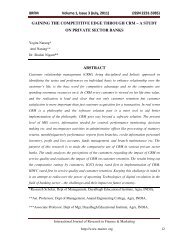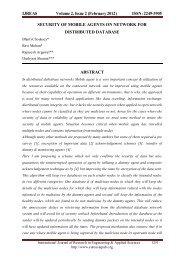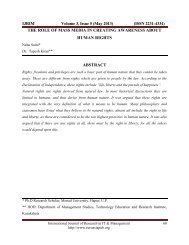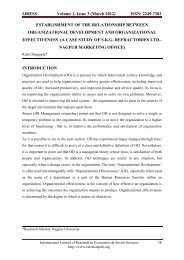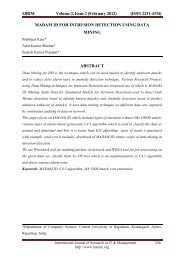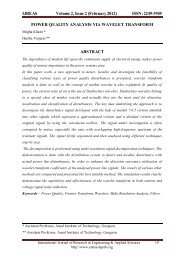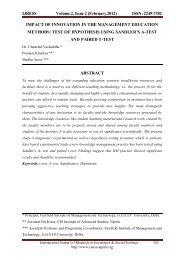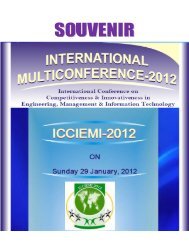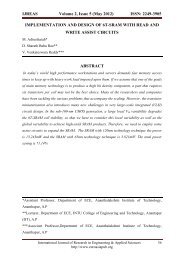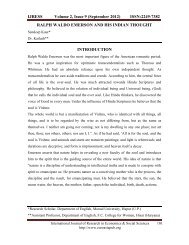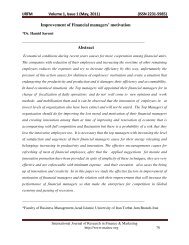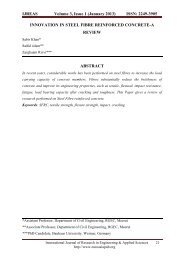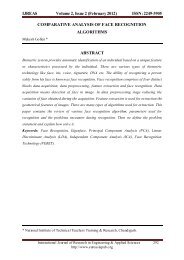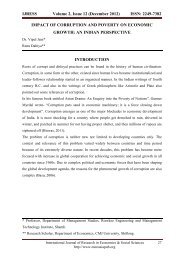shakespeare's sonnets - a critical analysis - Euroasiapub.org
shakespeare's sonnets - a critical analysis - Euroasiapub.org
shakespeare's sonnets - a critical analysis - Euroasiapub.org
Create successful ePaper yourself
Turn your PDF publications into a flip-book with our unique Google optimized e-Paper software.
IJRESS Volume 2, Issue 9 (September 2012) ISSN: 2249-7382<br />
matched by those who benefit from it. The poet, who calls the youth a “beauteous niggard,” or a<br />
miser of his good looks, claims that his young friend abuses the many gifts of beauty nature has<br />
given him and thus is a “profitless usurer,” a business term that recalls the three previous<br />
<strong>sonnets</strong>.<br />
Sonnet 4 summarizes all that the poet has been saying thus far. In a series of questions and<br />
statements, the poet lectures about the wise use of nature, which liberally lends its gifts to those<br />
who are equally generous in perpetuating nature by having children. But the youth's hoarding<br />
contrasts to nature's bountifulness. Lines 7 and 8 express this contrast in terms of usury:<br />
“Profitless usurer, why dost thou use, So great a sum of sums, yet canst not live” The term use<br />
here means both invest and use up. Similarly, “live” means both to gain immortality and to make<br />
a living.<br />
The inevitable conclusion is that if the youth does not properly use his beauty, he will die<br />
childless and doom himself to oblivion, but if he fathers a child, he will be remembered. The<br />
final couplet presents these contrasting possibilities. Line 13 uses familiar death imagery to<br />
express the negative result of dying childless: “Thy unused beauty must be tom-bed with thee.”<br />
However, line 14 suggests that should the young man use his beauty to have a child, an<br />
“executor to be,” his beauty will be enhanced because he will have used it as nature intended.<br />
SONNET 10<br />
Shakespeare's Sonnet 10 is a confrontation with the subject to bear children so that beauty may<br />
flourish within the narrator's family. Additionally, the narrator acknowledges that the subject's<br />
unwillingness to have children may stem from the subject's sense of worth. Because of this,<br />
throughout Sonnet 10 the narrator attempts to communicate that he and many others do love the<br />
subject. Thus, Sonnet 10 is best characterized by a husband's desire for his wife to be kind to<br />
herself and others by consenting to having children.<br />
The first two lines of Shakespeare's Sonnet 10 include the narrator urging the listener to admit<br />
they are not appropriately taking care of themselves. He even asserts that the subject is so poorly<br />
attending her own needs that she is beginning to appear to flout everyone's concern for her wellbeing<br />
and thus appears cruel. However, the first line contains foreshadowing for Shakespeare's<br />
ultimate thesis. Sonnet 10's narrator writes “For shame deny that thou bea'st love to any,” which<br />
under a superficial reading literally translates into “out of shamefulness admit you hold no love<br />
for anyone.” However, Shakespeare has chosen to use the word “bearst” specifically to reference<br />
International Journal of Research in Economics & Social Sciences 67<br />
http://www.euroasiapub.<strong>org</strong>



